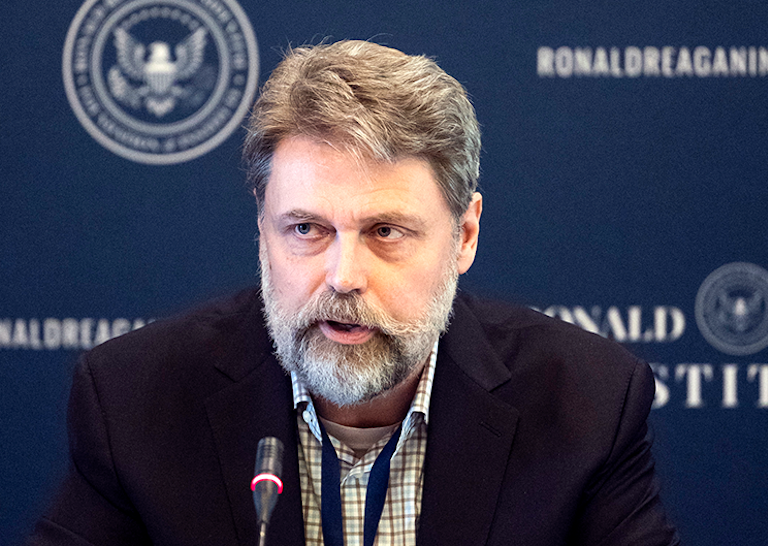Ronald Reagan Institute
What Does the Right Think? GOP Public Opinion on Foreign Policy | A Response from Colin Dueck
By Colin Dueck

What Does the Right Think? GOP Public Opinion on Foreign Policy
A Response from Colin Dueck
Daron Shaw has written a thoughtful, balanced, and grounded paper on conservative public opinion and American foreign policy. He is right to begin by noting that U.S. public opinion on international relations tends to be elite-driven and that partisan differences here are not as predictable as over domestic issues. There can be moments, such as the current one over Ukraine, where majorities in both parties support a relatively robust response to foreign aggression. Greater levels of education and political engagement tend to lead to support for an activist foreign policy, apart from the usual distinction of left versus right.
Shaw is correct in noting that conservatives have consistently supported maintaining U.S. defense spending to a greater degree than liberals, going back generations. As he points out, American conservatives are more likely than liberals to believe that peace is best maintained through strength—specifically, U.S. military strength. This is a consistent difference from the liberal perspective. Shaw is also right in drawing attention to the fact that conservatives today often favor what he calls inward-looking foreign policy goals, such as a focus on illegal immigration, as opposed to outward-looking goals such as strengthening the United Nations (UN). Having said that, as he points out, the exact foreign policy opinions of conservatives can vary depending upon who occupies the presidency. In our polarized political climate, adherents of both parties are more likely to back the foreign policy decisions of a co-partisan in the White House, regardless of specifics.
It is also interesting to note, as Shaw does, greater skepticism toward U.S. military power and intervention among younger Republicans in particular. This is not surprising. As those of us who teach on campus know first-hand, a whole generation of young Americans has now grown up without much adult experience or memory of successful U.S. military interventions overseas. The territorial rollback of the Islamic State in Iraq and Syria (ISIS) by 2018 is a notable exception.
There are few criticisms to make of such a well-considered paper. We are all interested to see if conservative internationalist priorities can command domestic political support in the coming years. I will confine myself to raising a few questions or points to be considered on this topic, in response to Shaw’s essay:
The reverse Top Gun effect. For those of us who came of age during the Reagan era, an underlying optimism regarding U.S. military power was justified by events, and we have tended to carry that optimism with us over the years. The tendency of today’s young Republicans to be especially skeptical of U.S. military intervention is an interesting and credible finding. Should we expect these younger Republicans to become more supportive of U.S. military power as they age, or is their skepticism baked in due to the era in which they grew up (i.e., post-Iraq and Afghanistan)?
What is the baseline expectation as normal conservative foreign policy opinion? Discussion of Republican foreign policy opinion today, including taglines of internationalism versus isolationism, are typically informed by some underlying sense of what is normal, mandatory, precedented, or recommended. Such discussions need to better reflect the fact that conservative foreign policy opinion has always varied on specifics depending on the circumstances of the day. The common conservative foreign policy view of 2003, for example, embraced a robust approach including a global war on terror, assertive democracy promotion, the war in Iraq, and a freedom agenda for the Greater Middle East. If we take that approach as our expected baseline, then the more inward-looking trend of our times might seem aberrant.
Historically, however, conservative voters—like most Americans—have normally been ambivalent about the use of force overseas. In that sense, 2003 was the exception rather than the rule. Forty years ago, even as President Reagan pursued an assertive anti-Soviet strategy with fair backing from conservatives, elements of that program tested the limits of popular support among the public at large. Fifty years ago, while conservatives were more ready than liberals to persist in Vietnam, many were increasingly ready to cut their losses and move on. Seventy years ago, when General Eisenhower ran for the Republican nomination against Senator Robert Taft (R-OH), the Grand Old Party (GOP) was divided between Midwestern nationalists and Northeastern internationalists. And one hundred years ago, as Matthew Continetti suggests in his new book The Right, the dominant Republican approach was one of non-intervention in European affairs, no entangling alliances, economic nationalism, a small standing army, and high protective tariffs. Considering the history of the GOP and the United States as a whole, a conservative foreign policy that is at least partially inward-looking and skeptical of foreign commitments is not so unusual.
Inward versus outward—or hardline versus liberal internationalist? Regarding current public opinion trends, Shaw points out that liberal Democrats tend to identify themselves as more supportive of certain foreign policy priorities such as combating global climate change, aiding refugees, strengthening the UN, and promoting human rights overseas, as compared to conservative Republican voters who tend to downplay these priorities. But note in that same 2021 Pew study (referenced in Shaw’s essay) that conservative Republicans are at least as supportive, if not more so, when it comes to counter-terrorism, limiting the power of North Korea, restraining the power of China, preventing the spread of weapons of mass destruction, limiting the power of Iran, and maintaining America’s military advantage and presence overseas.
In other words, today’s conservatives seem perfectly capable of outward-looking foreign policy priorities or commitments when they appear to serve vital U.S. security interests. Liberals on the other hand are typically less supportive than conservatives of outward-looking commitments when they involve the use of military power. This is in keeping with decades of research into underlying differences between liberals and conservatives over foreign policy issues. The central distinction here is not so much between inward and outward, as between a hardline approach to national security as opposed to a liberal internationalist one.
Presidential leadership and rubber bands. Voter opinion places broad limits on what a president can do in foreign policy, or at least creates political incentives for leaning one way as opposed to the other. Presidents are unlikely to become president if they do not show some respect for popular feeling on these matters. Public opinion research also suggests that voters can be resistant to persuasion when unconvinced of the merits of a given foreign policy proposal. At the same time, there is some fluidity to voter support on foreign policy, including a tendency to defer to any president of the same party, so long as key decisions do not run against basic coalitional interests.
This creates an opening for what can only be described as leadership. Presidents are not required to poll-test every foreign policy decision. They can set the agenda, nurture support for worthwhile initiatives, change the conversation, and lead on these matters. And many have done so. Therefore a better way to think about the relationship between presidents, foreign policy, and public opinion might be to think of the latter as a kind of elastic band. Support from the public can be stretched, but not broken. Wise presidents move foreign policy in the desired direction and pull on the elastic band without pulling it so far, so fast, or so hard that it breaks. A broken elastic band is useless. On the other hand, an elastic band that isn’t stretched at all also serves no purpose.
Reagan as a positive model. Ronald Reagan is a useful example of a president who stretched the rubber band of public support for a robust foreign policy without breaking it. As is well known, Reagan conceived of and implemented a bold, assertive strategy of anti-Communist containment and rollback, pressuring the Soviet Union not only militarily but economically and ideologically as well. The other half of his approach, which is often overlooked, is that he understood the limits of public patience and avoided costly, protracted military quagmires. There was no Vietnam on Reagan’s watch. He nurtured and maintained public support for an assertive strategy precisely by avoiding either international or political overreach. Both halves of that achievement are useful models for any conservative Republican president in the coming years.
Join Our Newsletter
Never miss an update.
Get the latest news, events, publications, and more from the Reagan Institute delivered right to your inbox.
